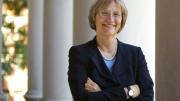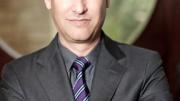In January, at the World Economic Forum in Davos, Switzerland, I participated in a panel discussion on MOOCs—massive open online courses—and the future of education. Massachusetts Institute of Technology President L. Rafael Reif and I had the opportunity to share our thoughts on edX, the nonprofit organization created by Harvard and MIT to make high-quality educational content and courses available online. EdX will enhance our understanding of learning and teaching on our campuses at the same time it brings knowledge to individuals across the globe.
Nearly 200,000 people, half of them from outside of the United States, enrolled in the initial edX courses taught by Harvard faculty this fall—Introduction to Computer Science I and Health in Numbers: Quantitative Methods in Clinical and Public Health Research. I expect to see even larger enrollments in the next slate of Harvard offerings, which includes an introduction to moral and political philosophy, an examination of global environmental change, and an exploration of the law of copyright. In The Ancient Greek Hero, the platform’s first humanities course, students will encounter the Homeric Iliad and Odyssey—and related art, film, and music—throughout time and across space, considering enduring characters and questions in an entirely new context. These courses are not lectures delivered through the web, but active learning experiences where students are asked to demonstrate understanding and connect with others to form participant communities.
Online learning has potential that would have recently been unimaginable. For example, I could not have envisioned when I was traveling in India just a year ago that the hunger for knowledge about public health expressed to me so frequently would be served so dramatically by our Health in Numbers course. Eight thousand people in India signed up. In addition to contributing to online discussion groups, 150 students spontaneously gathered in Mumbai to discuss the material, exchanging ideas and creating connections that they have sustained since the course’s conclusion. A meet-up in Bangalore featuring a Skype session with edX professors attracted a similar number of students from an array of courses who were eager to interact face to face.
Increasing access and making knowledge from diverse fields and disciplines much more broadly available are important aims, but there are other motivations for launching edX. We intend to leverage observations made in the digital space to understand what we might do better in our own classrooms and classrooms around the world—an aspiration that is already being realized. In response to tens of thousands of students completing assignments for his popular introduction to computer science course, David Malan of the School of Engineering and Applied Sciences developed a technology to assess student-submitted programs. He used the same technology in the in-person version of the course taught at Harvard College. The improvement saved him valuable time, which he, in turn, devoted to meetings with his students on campus. Reducing effort expended on routine activities creates more opportunities to explore, to experiment, and to engage in meaningful work. Higher education will continue to be advanced by digital innovations. The edX partnership is an opportunity for Harvard and MIT, together with a host of partner colleges and universities, to encourage new approaches, to develop new methods, and to drive assessment—all pursued in a spirit of boundless curiosity and an abiding openness to the wider world.
MOOCs and their potential captured considerable attention at Davos as business and political leaders speculated about the future of residential education, a conversation that will continue in the months and years ahead. I believe that online education offers us possibilities we have just begun to imagine for sharing knowledge more widely and teaching more effectively. But the power of residential education and interaction will not be undermined. Bringing thinkers and doers together is uniquely generative. Every day the magic that happens inside a Farkas or Paine Hall rehearsal room; across an i-lab whiteboard or a House dining room table; in a Law School classroom or a stem cell laboratory or dozens of other settings across our campus reminds us of the uplifting and transformative power of the company we are so lucky to keep.
Sincerely,
Drew Faust






